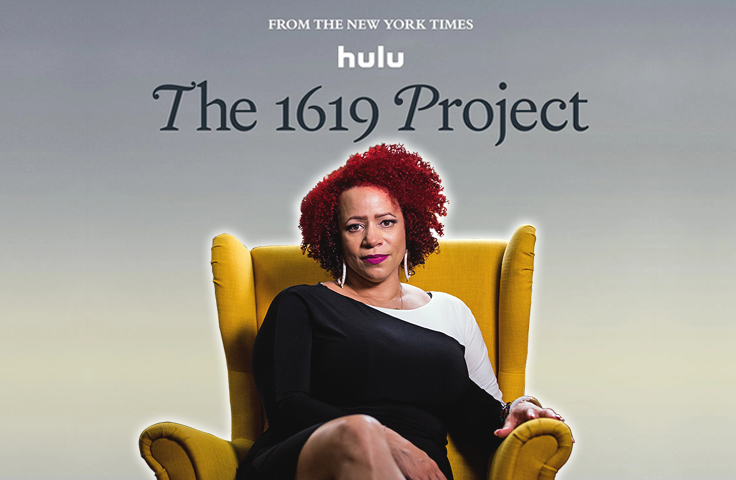Author's note / Disclaimer / Trigger warning: I haven't read The 1619 Project. Not the award-winning essay collection by Nikole Hannah-Jones and the New York Times. Or the best-selling anthology from Random House. Or the award-winning, best-selling children's book for adults. I haven't listened to the podcast, and don't intend to. Not when there are so many better ways to spend one's precious time.
The same is true for the vast majority of Americans, including the vast majority of black Americans. That's obvious, right? Same goes for the vast majority of internet users with strong opinions about whether The 1619 Project should be taught in public schools, and certainly the vast majority of pundits and politicians denouncing or defending it on television. This is often what passes for public discourse in the digital age—a shouting match among the passionately uninformed, while the people who know better (or value their sanity or simply don't care) tune out and say nothing.
What I do know is that America's élite universities are among the most radical purveyors of anti-anti-segregationist racial sensitivity nonsense, and among the quickest to quash even the slightest dissent in the ranks. In this context, the fact that several history professors from Yale, Princeton, Brown, and Northwestern felt strongly enough to criticize The 1619 Project for its historical "errors and distortions" is profoundly damning. I'll take their word for it.
I also know that anyone—Nikole Hannah-Jones, for example—who charges a public library $900 per minute to tell an audience of bourgeois liberals that the United States is "one of the most unequal societies in the history of the world" might not value historical accuracy as much as other things. Ditto a cultural establishment that promotes her work on numerous platforms and showers her with awards. Perhaps we are meant to take her seriously, but not literally?
A serious person wouldn't say something so absurd in a public setting and claim it was "a fact." (Or admit to believing in "the zodiac.") But that's just how most Democratic politicians, journalists, and other professional left-wing activists who demand to be taken seriously communicate these days. The world is ending. Democracy is dying. "Jim Crow on steroids." No wonder so many of their kids have turned to domestic terrorism.
They teach this bullshit in universities, applaud it at corporate-sponsored diversity summits, and it's available now for streaming on Hulu, a jointly owned subsidiary of NBC Universal and The Walt Disney Company. Because I'm being paid to do it, I watched The 1619 Project documentary series.
Here's what I learned from Episode 1:
Nikole Hannah-Jones was "embarrassed" by the American flag her father, a black Army veteran, flew outside the family home in Waterloo, Iowa. Then she took a black studies course in high school, and everything changed. The emotions she cultivated in that class "would field a quest for truth that would shape my life," says Hannah-Jones, a C-list celebrity who identifies as a journalist, in episode one of The 1619 Project.
The Hulu documentary series—executive-produced by Oprah Winfrey—is the fifth official iteration of the New York Times collection of racially charged essays published in 2019. (It has also inspired at least nine plays I will never see.) The first episode, titled "Democracy," is about how little has changed since black Americans were systematically denied the right to vote during the actual Jim Crow period, before the steroids.
MacArthur Cotton is a former student activist and Freedom Rider. In 1963, he was arrested and tortured for occupying a courthouse in Greenwood, Miss. He risked his life so that Hannah-Jones could charge that public library $900 per minute. So that one day she could sit across from him wearing pristine Air Jordan sneakers and make this documentary and compare her personal struggle to the actual struggle Cotton and his peers endured.
Hannah-Jones recounts the "backlash" to her work, how she became the "target of conservative politicians" and navigated "one of the most unequal societies" in world history to become one of the most celebrated and highly compensated journalists of her generation. Her story, we are told, is one that "mirrors the fight to include black Americans in democracy itself," which persists to this day.
For example, we are shown a group of activists monitoring the 2022 election in Georgia. They have sprung into action after a "clerical error" assigned incorrect ZIP codes to a group of mostly black seniors in an affordable housing community. Officials at the local polling station initially directed them to another location 20 minutes away. Phone calls were made. The error was resolved and everyone got to vote. Just like Jim Crow.
Georgia is where President Joe Biden gave a speech likening his Republican opponents to segregationists George Wallace and Bull Connor. The sensationalist rhetoric from Democrats about "voter suppression" prompted some of the most powerful corporations to denounce the state's GOP lawmakers, who had enacted legislation to roll back the emergency measures implemented at the height of the COVID-19 pandemic.
What actually happened in Georgia? Black turnout went through the roof. The first black U.S. senator in state history was reelected; his Republican opponent was also black. Gov. Brian Kemp (R., Ga.) more than doubled his support among black voters compared with 2018. According to the ideology peddled by Hannah-Jones and her various patrons, this is an existential threat to democracy—evidence that these black voters can't think for themselves and are easily swayed by "disinformation."
Kemp's opponent, national celebrity Stacey Abrams, raised $100 million, then complained about racism and "voter suppression" when she lost. Again. By a lot. Now her campaign and affiliated groups face questions about their shady financial practices. Cotton risked his life for her, too.
